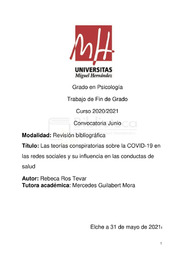Por favor, use este identificador para citar o enlazar este ítem:
https://hdl.handle.net/11000/8238Registro completo de metadatos
| Campo DC | Valor | Lengua/Idioma |
|---|---|---|
| dc.contributor.advisor | Guilabert Mora, Mercedes | - |
| dc.contributor.author | Ros Tevar, Rebeca | - |
| dc.contributor.other | Departamentos de la UMH::Psicología de la Salud | es |
| dc.date.accessioned | 2021-09-13T16:05:49Z | - |
| dc.date.available | 2021-09-13T16:05:49Z | - |
| dc.date.created | 2021-06 | - |
| dc.date.issued | 2021-09-13 | - |
| dc.identifier.uri | http://hdl.handle.net/11000/8238 | - |
| dc.description.abstract | La influencia de las redes sociales en la conducta humana se ha hecho más prevalente en estos últimos años y las teorías conspiratorias sobre la salud han conseguido más seguimiento gracias a su difusión en ellas. Esto conlleva a que en situaciones como la pandemia por SARS-CoV-2 las conductas de salud se puedan ver afectadas por estas teorías en las redes. Y por ello, el objetivo de esta revisión es mostrar la relación que tienen las teorías conspiratorias sobre la COVID-19 y las conductas de salud recomendadas, determinar cuáles han sido las redes sociales que más han ayudado a su difusión, definir y conocer cuáles han sido las teorías más prevalentes y las que han tenido mayor seguimiento durante la pandemia, esto se ha hecho a través de una búsqueda bibliográfica en tres de las bases de datos principales. Los resultados muestran que las teorías han afectado de manera negativa a las conductas de salud, sobre todo a la vacunación, que una de las más apoyadas trataba sobre la creación del virus en un laboratorio gubernamental y que la red social que más ha contribuido en la difusión es YouTube. | es |
| dc.description.abstract | The influence of social networks on human behavior has become more prevalent in recent years and conspiracy theories about health have gained more following thanks to their diffusion in them. This means that in situations such as the SARS-CoV-2 pandemic, health behaviors can be affected by these theories on the networks. And for this reason, the objective of this review is to show the relationship that conspiracy theories have on COVID-19 and recommended health behaviors, determine which have been the social networks that have helped the most in its dissemination, define which have been the most prevalent theories and knowing which ones have had the greatest follow-up during the pandemic, this has been done through a bibliographic search in three of the main databases. The results show that the theories have negatively affected health behaviors, especially vaccination, that one of the most supported was about the creation of the virus in a government laboratory and that the social network that has contributed the most to the difusion it's YouTube. | es |
| dc.format | application/pdf | es |
| dc.format.extent | 21 | es |
| dc.language.iso | spa | es |
| dc.rights | info:eu-repo/semantics/openAccess | es |
| dc.subject | covid-19 | es |
| dc.subject | social networks | es |
| dc.subject | redes sociales | es |
| dc.subject | teorías conspiratorias | es |
| dc.subject | conductas de salud | es |
| dc.subject | fake news | es |
| dc.subject | conspiracy theories | es |
| dc.subject | health behavior | es |
| dc.subject.other | CDU::1 - Filosofía y psicología::159.9 - Psicología | es |
| dc.title | Las teorías conspiratorias sobre la COVID-19 en las redes sociales y su influencia en las conductas de salud | es |
| dc.type | info:eu-repo/semantics/bachelorThesis | es |

Ver/Abrir:
Las teorías conspiratorias sobre la COVID-19 en las redes sociales y su influencia en las conductas de salud.pdf
564,72 kB
Adobe PDF
Compartir:
 La licencia se describe como: Atribución-NonComercial-NoDerivada 4.0 Internacional.
La licencia se describe como: Atribución-NonComercial-NoDerivada 4.0 Internacional.
Herramientas de Administrador
.png)